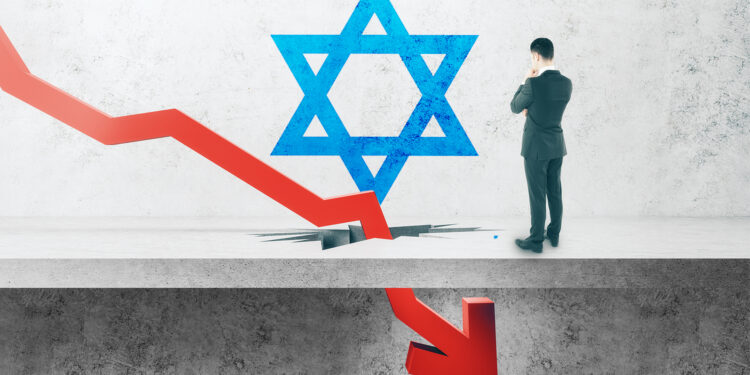7/31/2024–|Last update: 7/31/202407:33 PM (Makkah Time)
Israel assassinated the head of the political bureau of the Islamic Resistance Movement (Hamas), Ismail Haniyeh, today, Wednesday, according to the movement’s announcement, making him the latest resistance leader targeted after multiple assassination attempts.
Will the Israeli economy be affected after this operation? And what does its harvest look like after 9 months of war on the Gaza Strip?
Dr. Ahmed Al-Bahnasi, an expert in Israeli affairs, says that despite the difficulty of monitoring the initial economic damage to the Israeli economy from the assassination of Haniyeh, there are two main aspects that were directly affected by the assassination. The first is the aviation sector after Israel suspended its movement in the north in anticipation of a response from any of the fronts supporting the Gaza Strip in the war, according to the media. The second aspect is the currency, which fell to the lowest point in a month.
In early trading on Wednesday, the shekel fell to 3.77 to the dollar, down from 3.75 shekels at the close of Tuesday’s session, according to data from the Bank of Israel and global exchange rate platforms.
The exchange rates recorded in early trading today are the lowest since the end of last June.
Longer term effects
Al-Bahnasi added to Al Jazeera Net that the longer-term economic impact of the assassination depends on the response that Israel will receive from Iran or the fronts supporting the Palestinian resistance.
He relied on Israeli media to say that more unrest on the northern front (near the Lebanese border) would push the occupation army to call up more reserve soldiers, which would affect the work of companies, in addition to further declining the exchange rate of the shekel.
For his part, the expert in Israeli affairs, Ashraf Shaaban, added that the assassination of Ismail Haniyeh finished off… aMany investors are hoping for the Israeli economy to return to normal, especially after the assassination attempt on Hezbollah leader Fouad Shukr yesterday and the targeting of the Yemeni port of Hodeidah.
Shaaban, speaking to Al Jazeera Net, expects the region to witness a wider war in the coming period, which will increase economic risks and put pressure on all sectors of the Israeli economy as a result of calling up more reserve soldiers.
The most prominent losses of the Israeli economy
Israel’s economy is suffering from ongoing losses due to its ongoing war on the Gaza Strip, which has led to increased public spending, a decline in the credit rating, the suffering of companies, and damage to various economic sectors.
These are the most prominent losses at the macro and microeconomic levels:
- Israel’s fiscal deficit widened in June to 7.6% of gross domestic product over the previous 12 months, or NIS 146 billion ($39.77 billion). That’s up from 7.2% in May.
- Government spending since the beginning of the year has risen above NIS 300 billion ($81.72 billion), an increase of 34.2% compared to the same period last year.
- Standard & Poor’s rates Israel at A+, downgrading it from AA-, while Moody’s rates it at A2, equivalent to A on the S&P scale, and the third rating agency, Fitch, gives Israel an A+ rating.
- 60,000 businesses are expected to close this year, The Times of Israel reported.
- Many construction sites in Israel have been closed after 85,000 Palestinian workers were prevented from working there since the beginning of the war due to security concerns, while many foreign workers working on these sites have left.
- The Bank of Israel kept interest rates unchanged at 4.5% for the fourth consecutive meeting this month, maintaining its cautious policy due to the war.
- The Bank of Israel (the central bank) lowered its growth forecast for the economy with a “high level” of geopolitical uncertainty, amid expectations of a prolonged and more severe war with the Palestinian resistance, and an increased risk of escalation with Hezbollah on the northern border.



